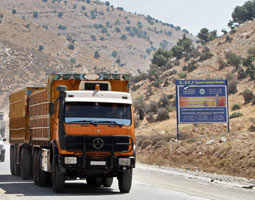
A Syrian commercial vehicle rumbles across the Lebanon border along a possible smuggling route for Hezbollah. (AP/Kevork Djansezian)
Even as the Israeli Defense Forces backed out of Lebanon this month, in accordance with an August 11 UN-brokered ceasefire agreement, there were murmurings that Hezbollah might not be honoring its end of the bargain. Security Council resolution 1701, which ended the monthlong conflict this summer, called for the group to disarm and for an immediate cessation of weapons shipments from Syria and Iran-terms which Hezbollah’s leader, Hassan Nasrallah, nominally accepted at the time of the agreement. But just this week, tensions heightened after accusations that Hezbollah may be attempting to rearm. This may foreshadow what CFR President Richard N. Haass, writing in Foreign Affairs, describes as a “New Middle East,” in which “outside actors have relatively modest impact and local forces enjoy the upper hand.”
On October 15, Israeli General Yossi Baidatz reported to the country’s defense minister that there was “unequivocal proof” (Haaretz) of ongoing weapons smuggling from Syria. Syria’s President Bashar Assad has not denied that arms are still smuggled into Lebanon, but said in a recent interview with the Kuwaiti paper al-Anba that smuggling occurs in all directions, and is beyond the control of Syria’s government. “The smuggling comes from Iraq, Lebanon, and all over the place,” Assad said. “It cannot be stopped.” The Lebanese army has taken a tougher line (AFP) on Baidatz’s statements, saying the northern Lebanese border has been under strict surveillance and that no smuggling has taken place.
Now some experts worry a flare-up between Israel and Syria could undermine the work of UN peacekeepers and the baby steps of progress made since August. Samuel Lewis and Edward S. Walker Jr., two former U.S. ambassadors to Israel, write in the Boston Globe, “Hezbollah’s rearmament could reignite the conflict with Israel and jeopardize UN Security Council Resolution 1701.” This echoed John Bolton, the U.S. Ambassador to the UN, who made similar comments in August. “If the international community applies only a temporary band-aid solution to the problem and allows Hezbollah to regroup and rearm, then the suffering of the people of Lebanon and Israel may very well intensify in the near future,” Bolton said.
Experts say reverberations from the current dispute could undermine the UN’s authority in the region. The UN mission in Lebanon, or UNIFIL, had stationed more than 5,700 troops as of October 13, under the control of a French force commander, Gen. Alain Pellegrini. The force has come under increasing criticism from within Lebanon in recent days. On October 17, Sayyed Mohammad Hussein Fadlallah, Lebanon’s most senior Shiite cleric, said Lebanese were right to be wary (Daily Star) of UNIFIL’s authority, saying the force had “come here to protect Israel, not Lebanon.” Nasrallah’s remarks are blunter. At a recent rally, he warned the UN not to spy (LAT) on “the resistance,” and declared, “No army in the world is capable of forcing us to give up our weapons.” As UN troops work to stabilize one of the most fragile regions of the world, these are unwelcome signs indeed.
Lebanon, for its part, is not banking on the UN to defend it, and reportedly has struck a deal with Italy (DEBKAfile) to obtain sophisticated air defense missiles capable of bringing down Israeli warplanes in a future conflict. For deeper reading, CFR offers backgrounders on the troubled history of multilateral operations in the Middle East, on the fractured loyalties of Lebanon’s army, and on key UN resolutions in the Middle East conflict. Globalsecurity.org offers this guide to Lebanon’s military.


